|
|
|
Sort Order |
|
|
|
Items / Page
|
|
|
|
|
|
|
| Srl | Item |
| 1 |
ID:
159247
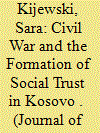

|
|
|
|
|
| Summary/Abstract |
While a new, growing subset of the literature argues that armed conflict does not necessarily erode social cohesion in the postwar era, we challenge this perspective and examine how civil war experiences shape social trust in Kosovo after the war from 1998 to 1999. Based on a nationwide survey conducted in 2010 and the disaggregated conflict event data set of the Armed Conflict Location & Event Data Project, we simultaneously analyze the impact of individual war-related experiences and exposure to war in the community through hierarchical analyses of twenty-six municipalities. Our findings confirm that civil war is negatively related to social trust. This effect proves to be more conclusive for individual war experiences than for contextual war exposure. Arguably, the occurrence of instances of violence with lasting psychological as well as social structural consequences provides people with clear evidence of the untrustworthiness, uncooperativeness, and hostility of others, diminishing social trust in the aftermath of war.
|
|
|
|
|
|
|
|
|
|
|
|
|
|
|
|
| 2 |
ID:
148793
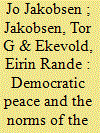

|
|
|
|
|
| Summary/Abstract |
The democratic peace literature has convincingly shown that democracies do not fight other democracies. Theoretical explanations of this empirical phenomenon often claim that the citizenry in democracies prefers peaceful resolution of interstate conflicts. Still, there is a dearth of studies exploring the public’s preferences and values directly. We seek to rectify this by investigating, in a novel way, the relationship between regime type and citizens’ bellicosity. A comprehensive multilevel research design is employed, with data spanning 72 countries over the period of 1981–2008. This enables us to test one of the theoretical mainstays of the democratic peace thesis, viz., that regime type helps shape individuals’ attitudes toward war-fighting. Our results lend special support to normative democratic peace theory: Citizens of democracies are significantly more pacifistic than citizens of non-democracies. This result upholds when we rigorously control for other relevant factors, including specific characteristics of individuals and rival theoretical explanations.
|
|
|
|
|
|
|
|
|
|
|
|
|
|
|
|
| 3 |
ID:
096600
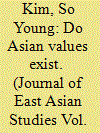

|
|
|
|
|
| Publication |
2010.
|
| Summary/Abstract |
The Asian values debate has been long on speculative advocacy but short on empirical validation, with statistical tests emerging only lately. This study explores two questions: whether Asians indeed hold distinct cultural attitudes when compared with non-Asians and whether these cultural attitudes and beliefs identified as Asian values form coherent dimensions among Asians. The study first identifies four dimensions of Asian values based on a review of various Asian values discourses: familism, communalism, authority orientations, and work ethic. The findings from the empirical analysis based on multilevel models and factor analysis return mixed support for the Asian values hypothesis. Although East Asian respondents do exhibit strong work-related values compared with those from other regions, commitment to familial values and authoritarian orientations are actually lower among East Asians. Also, while preference for strong leadership and parental duty do turn out to form distinct sets of attitudes among South and Southeast Asians, the four dimensions do not constitute a clear value complex in the minds of East Asians.
|
|
|
|
|
|
|
|
|
|
|
|
|
|
|
|
| 4 |
ID:
111867
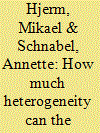

|
|
|
|
|
| Publication |
2012.
|
| Summary/Abstract |
Cultural and economic heterogeneity is often seen as a major threat to modern welfare states. This article contributes to the discussion of how much heterogeneity the welfare state can endure by theoretically and empirically focusing on the relationship between different levels of national identity and the support for welfare state policies. We analyse the effect of different types of national identity on attitudes towards taxation and redistribution. We show that it is the subjective aspect of national identity, or social cohesion, that in fact matters for predicting attitudes to the welfare state. In comparison, more objective measures of heterogeneity like the inequality of income distribution, language fractionalisation or the percentage of foreign-born individuals do not have any effect on attitudes to the welfare state.
|
|
|
|
|
|
|
|
|
|
|
|
|
|
|
|
| 5 |
ID:
149754
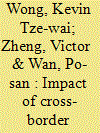

|
|
|
|
|
| Summary/Abstract |
Using official statistics and a pooled dataset of longitudinal surveys, the aim of this article is to examine the impact of the Individual Visit Scheme (IVS) on political trust in Hong Kong. Our multilevel analysis found that the gradual inflow of IVS visitors (mostly overnight visitors) increased political trust in the first few years, but that this trust rapidly diminished in later years, especially after the introduction of the one-year multiple-entry IVS endorsement (which attracted mostly same-day visitors). The main reason for the reduction in the positive impact of the IVS scheme is that the growth in the number of same-day visitors has contributed less to Hong Kong's economy than has the increase in the number of overnight visitors, and has exacerbated several social problems. The impact of mainland visitors has varied across groups with different levels of education. The political trust of people with a senior secondary education has been enhanced more by the increase in overnight visitors and reduced less by the increase in same-day visitors than that of people with a tertiary level of education or a junior secondary education or below.
|
|
|
|
|
|
|
|
|
|
|
|
|
|
|
|
| 6 |
ID:
106944
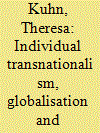

|
|
|
|
|
| Publication |
2011.
|
| Summary/Abstract |
Recent trends of mass-level euroscepticism seriously challenge Deutsch's transactionalist theory that increased transnational interactions trigger support for further political integration. While transnational interactions have indeed proliferated, public support for European integration has diminished. This article aims to solve this puzzle by arguing that transnational interaction is highly stratified across society. Its impact on EU support therefore only applies to a small portion of the public. The rest of the population not only fails to be prompted to support the integration process, but may see it as a threat to their realm. This is even more the case as, parallel to European integration, global trends of integration create tensions in national societies. The following hypotheses are proposed: first, the more transnational an individual, the less she or he is prone to be eurosceptical; and second, this effect is more pronounced in countries that are more globalised. A multilevel ordinal logit analysis of survey data from the 2006 Eurobarometer wave 65.1 confirms these hypotheses.
|
|
|
|
|
|
|
|
|
|
|
|
|
|
|
|
| 7 |
ID:
167069
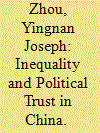

|
|
|
|
|
| Summary/Abstract |
The social volcano thesis states that the rising inequality in China threatens regime stability. This idea, although widely held in the media and in academia, is backed by little positive evidence but by much negative evidence. Two primary pieces of negative evidence are that the Chinese people trust the central government and that they are highly tolerant of inequality. This paper discusses the shortcomings of the negative evidence and re-examines the thesis in a rigorous and direct way. Our multilevel analysis shows that provincial inequality has negative effects on individuals’ trust in the local government but not in the central government, and this negative effect holds for both the rich and the poor. Because distrust in the local government implies distrust in the central government, we conclude that a social volcano exists.
|
|
|
|
|
|
|
|
|
|
|
|
|
|
|
|
| 8 |
ID:
123011


|
|
|
|
|
| Publication |
2013.
|
| Summary/Abstract |
Which new parties entered national parliaments in advanced democracies over the last four decades and how did they perform after their national breakthrough? This article argues that distinguishing two types of party formation (that facilitate or complicate party institutionalisation) helps to explain why some entries flourish, while others vanish quickly from the national stage. New parties formed by individual entrepreneurs that cannot rely on ties to already organised groups are less likely to get reelected to parliament after breakthrough than rooted newcomers. This hypothesis is tested on a newly compiled dataset of new parties that entered parliaments in 17 advanced democracies from 1968 onwards. Applying multilevel analyses, the factors that shape newcomers' capacity to reenter parliament after breakthrough are assessed. Five factors have significant effects, yet affect party performance only in particular phases: both a party's electoral support at breakthrough and its operation in a system with a strong regional tier increase the likelihood of initial reelection. In contrast, a distinct programmatic profile, the permissiveness of the electoral system and easy access to free broadcasting increase a party's chance of repeated reelection. Only formation type significantly affects both phases and does so most strongly, substantiating the theoretical approach used in this article.
|
|
|
|
|
|
|
|
|
|
|
|
|
|
|
|
| 9 |
ID:
157491


|
|
|
|
|
| Summary/Abstract |
Sexual harassment remains a persistent problem in the U.S. military despite extensive research and policy initiatives. Theoretical explanations identify individual circumstances (e.g., power differentials) and organizational factors (e.g., climate, culture). However, data constraints limit the capacity to link individual contexts with independent measures of environments.
|
|
|
|
|
|
|
|
|
|
|
|
|
|
|
|
| 10 |
ID:
177105
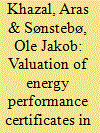

|
|
|
|
|
| Summary/Abstract |
The implementation of Energy Performance Certificates (EPCs) is expected to reduce energy consumption and carbon emissions by providing actors with information that can be used to make better-informed decisions. This paper is the first to investigate EPCs in the Norwegian residential rental market. Applying the hedonic multilevel approach using information from some 440,000 rental contracts over the period of 2011–2018, we find that labeled dwellings have a premium compared with non-labeled dwellings, and that the premium is increasing with a higher EPC-label. We further define two classes of lessors – professional (real estate agents) and nonprofessionals (homeowners) – to study potential heterogeneity in EPC valuation and find that professionals assign higher rents compared with nonprofessionals. Dwellings with high energy efficiency are associated with a higher premium if rented out by a professional, a significant part of which stemming from higher EPC valuation. The results are robust to a number of heterogeneity analyses and after controlling for sample selection bias and unobserved locational heterogeneity. The findings of this paper signify the necessity to increase awareness and public dissemination regarding the EPC policy.
|
|
|
|
|
|
|
|
|
|
|
|
|
|
|
|
|
|
|
|
|